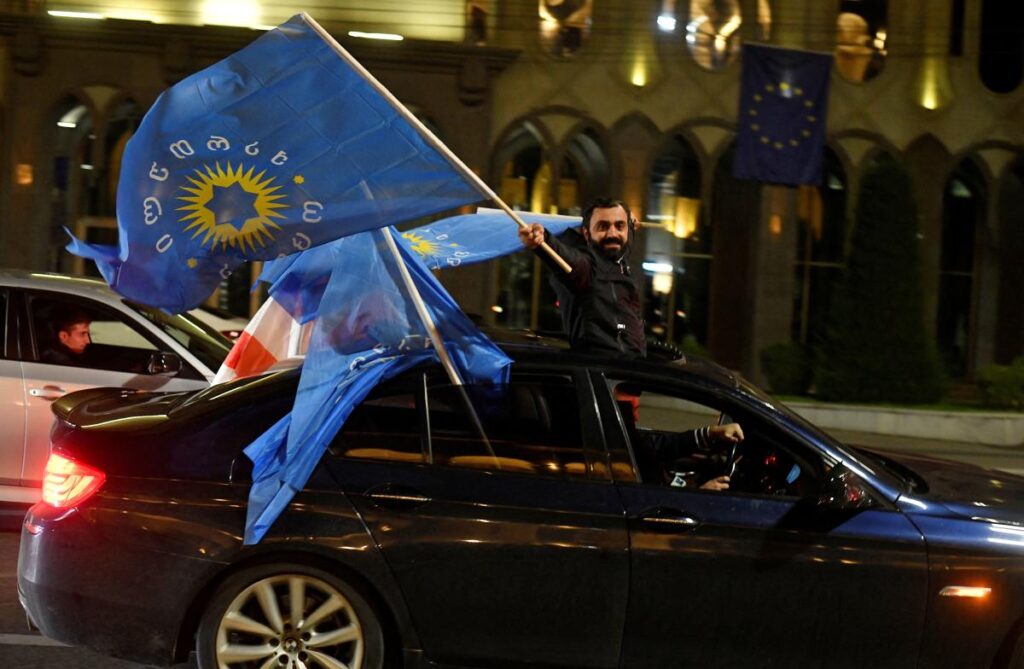In the aftermath of the recent general election in Georgia, the pro-Russian ruling party, Georgian Dream, declared a decisive victory, claiming over 54% of the votes. However, this outcome has been met with significant backlash from pro-European opposition parties who have alleged that the elections were marred by rigging and irregularities. Georgian President Salome Zourabichvili has publicly contested the validity of the election results, accusing the ruling party of electoral fraud and asserting that Russian interference played a critical role in the proceedings. In light of these claims, Zourabichvili has called for protests against what she perceives as an unjust electoral process. As tensions rise, Hungary’s President Victor Orbán plans to visit Georgia to extend personal congratulations to Georgian Dream, highlighting his close ties with Russian President Vladimir Putin amidst an escalating domestic and international incident.
Global scrutiny and accusations of misconduct have intensified against Georgian Dream, particularly from European Union (EU) officials. The head of the European Parliament delegation in Georgia described the electoral outcome as part of a “sophisticated, widespread and well-orchestrated scheme” orchestrated by the ruling party. This is indicative of Georgian Dream’s recent trajectory, which has increasingly leaned towards strengthening ties with Russia, causing alarm among EU nations. Calls for thorough investigations into the electoral process have gained momentum, while the United States has reportedly prepared sanctions targeting Georgian leaders involved in the alleged misconduct. Concerns have arisen regarding Orbán’s visit, as some fear that his actions could signal EU endorsement of the disputed results, potentially further complicating the geopolitical dynamics between Western powers and Moscow.
The quest for EU membership, a long-standing goal for Georgia that enjoys support from around 80% of the population, appears to be slipping away with Georgian Dream’s apparent electoral success. The party, led by billionaire Bidzina Ivanishvili, has adopted what many observers describe as an “authoritarian turn,” straying significantly from its earlier pro-Western stance. Opposition figures viewed the election as a pivotal moment to redirect the country back towards its European aspirations. Unfortunately, the electoral outcomes suggest that instead of moving closer to the EU, Georgia may be aligning itself more closely with Russian interests and influence. This shift raises concerns about the potential establishment of Georgia as a client state of Moscow, which poses significant implications for regional stability and the integrity of pro-European movements in the country.
As the dust settles from the elections, the potential for public dissent looms on the horizon. Unlike the 2020 elections, which also faced accusations of irregularities but lacked substantial backing from Western governments, the current situation is different. With heightened international scrutiny and explicit allegations of fraud, the conditions are ripe for a resurgence of protests among disenchanted citizens who are eager to reclaim Georgia’s pro-European path. The Economist suggests that while initial reactions may be subdued, there exists the possibility of an escalating protest movement as the population responds to perceived injustices in the electoral process.
Complicating these developments is the role of Hungarian diplomacy in the region, specifically under Orbán’s influence. The visit by Orbán, often labeled the “EU’s troublemaker-in-chief,” adds an intriguing layer to the unfolding crisis. Observers note that his presence in Georgia might not only amplify the legitimacy of Georgian Dream’s claims but could also inadvertently challenge the unified stance of the EU against Russian influence in Eastern Europe. This scenario presents a delicate situation for EU diplomats who are wary of the fracturing consensus among member states regarding the proper approach to uphold democratic integrity in neighbors like Georgia.
In conclusion, the outcome of Georgia’s recent general election has raised serious concerns about the future of the country’s aspirations for European integration and its increasing alignment with Russian interests. Allegations of vote rigging and fraud have galvanized opposition parties, and international criticism has poured in from various quarters seeking transparency and accountability in the electoral process. The geopolitical implications of Orbán’s visit and the weakened stance of pro-European factions within Georgia set the stage for an ongoing struggle to maintain democratic principles and resist external influences. As the situation develops, the potential for heightened activism among the populace against the ruling party will be critical in determining whether Georgia can reclaim its European trajectory or if it will continue down a path that risks subservience to Russian power.

